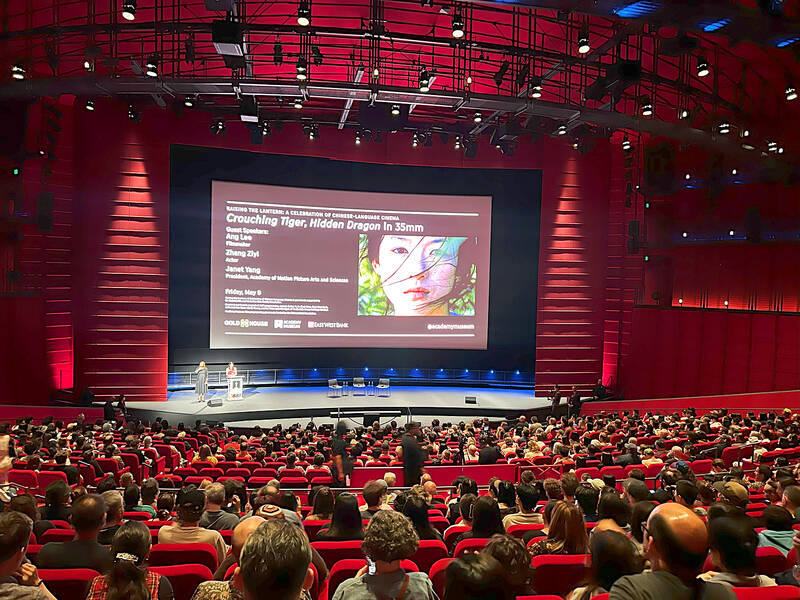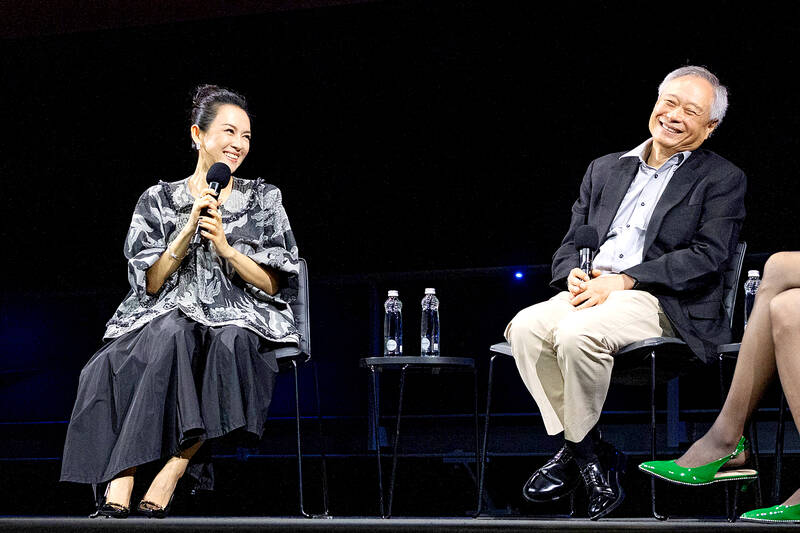World-renowned Taiwanese-American director Ang Lee (李安) reflected on the motivation behind his Oscar-winning film Crouching Tiger, Hidden Dragon (臥虎藏龍) in comment he made at a special pre-screening event to celebrate the 25th anniversary of the film’s release in Los Angeles.
"Crouching Tiger, Hidden Dragon is the way I look for my imaginary classic China," Lee said at the event held on Friday evening at the Academy Museum of Motion Pictures.
"It’s a movie [where] I try to jam everything I know, [everything] I like, and [things that are] conflicting into one movie — that’s why it’s so difficult," Lee said, adding that he tried to bring the "most classic Chinese culture" and the "most refined behavior" into the 120-minute work.

Photo: CNA
Despite the martial arts film winning four Oscars at the 73rd Academy Awards in 2001 — for International Feature Film, Cinematography, Art Direction and Original Score — Lee said he kept asking himself throughout the entire production in China at the time, "What the hell am I doing?" while fearing that the outcome would be "really bad."
The Taiwan-born director further elaborated that, as someone grappling with identity issues, he feels a strong connection to classic Chinese heritage, shaped by his parents’ migration to Taiwan from China during the Chinese Civil War, "but that [heritage] doesn’t really exist anymore."
By making the film, Lee said he sought to construct his imagined version of a classic China within a fictional cinematic world.

Photo: Getty Images via AFP
He recalled how the production team included people from Hong Kong, Taiwan, China and the US — all working together to chase the same "dragon," a metaphor for the fading image of China in their hearts.
Regarding insecurity surrounding identity, Lee said it has always been a central theme in his films, with questions such as where he belongs and what he can believe in.
Lee said that when he first came to study in the US, he was seen as a foreigner, and when he went to China to shoot films, he was viewed as Taiwanese, leaving him unsure of where he truly belongs.
With this year marking the 25th anniversary of the film’s release, the 70-year-old Lee said that he could hardly believe how much energy he had back then to pull off such a movie.
He compared the effort of shooting the film to handcrafting a spaceship, as the crew tackled the massive task of portraying China’s vast landscapes, from the deserts of Xinjiang and the city of Beijing to the bamboo forests of southern China, the latter capturing the film’s iconic combat scene between the lead actors.
"How did I do that? I can’t do that anymore. How much energy, how much passion," Lee said.
"The movie is better than I thought, actually — it did pretty good. We should be very proud," he added, drawing laughter from a full house in the museum’s theater.
The pre-screening discussion — which was also attended by Janet Yang (楊燕子), president of the Academy of Motion Picture Arts and Sciences, and Zhang Ziyi (章子怡), one of the film’s leading actresses — is part of a six-week screening series celebrating Chinese-language films submitted to the Oscars’ International Feature Film category over the past 35 years.

A small number of Taiwanese this year lost their citizenship rights after traveling in China and obtaining a one-time Chinese passport to cross the border into Russia, a source said today. The people signed up through Chinese travel agencies for tours of neighboring Russia with companies claiming they could obtain Russian visas and fast-track border clearance, the source said on condition of anonymity. The travelers were actually issued one-time-use Chinese passports, they said. Taiwanese are prohibited from holding a Chinese passport or household registration. If found to have a Chinese ID, they may lose their resident status under Article 9-1

Taiwanese were praised for their composure after a video filmed by Taiwanese tourists capturing the moment a magnitude 7.5 earthquake struck Japan’s Aomori Prefecture went viral on social media. The video shows a hotel room shaking violently amid Monday’s quake, with objects falling to the ground. Two Taiwanese began filming with their mobile phones, while two others held the sides of a TV to prevent it from falling. When the shaking stopped, the pair calmly took down the TV and laid it flat on a tatami mat, the video shows. The video also captured the group talking about the safety of their companions bathing

A classified Pentagon-produced, multiyear assessment — the Overmatch brief — highlighted unreported Chinese capabilities to destroy US military assets and identified US supply chain choke points, painting a disturbing picture of waning US military might, a New York Times editorial published on Monday said. US Secretary of Defense Pete Hegseth’s comments in November last year that “we lose every time” in Pentagon-conducted war games pitting the US against China further highlighted the uncertainty about the US’ capability to intervene in the event of a Chinese invasion of Taiwan. “It shows the Pentagon’s overreliance on expensive, vulnerable weapons as adversaries field cheap, technologically

Starting on Jan. 1, YouBike riders must have insurance to use the service, and a six-month trial of NT$5 coupons under certain conditions would be implemented to balance bike shortages, a joint statement from transportation departments across Taipei, New Taipei City and Taoyuan announced yesterday. The rental bike system operator said that coupons would be offered to riders to rent bikes from full stations, for riders who take out an electric-assisted bike from a full station, and for riders who return a bike to an empty station. All riders with YouBike accounts are automatically eligible for the program, and each membership account